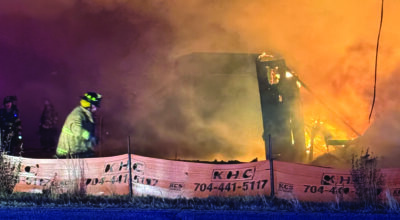Judge rejects Cherokee challenge against new casino in Kings Mountain
Published 12:00 am Saturday, April 17, 2021
By MICHELLE LIU
Associated Press/Report for America
A federal judge on Friday rejected a legal challenge by the operator of North Carolina’s two casinos, saying that the tribe had no grounds to oppose a competitor’s plans for a third gambling operation in the state.
The South Carolina-based Catawba Indian Nation has already begun working to establish Vegas-style gaming on the Kings Mountain, North Carolina site, about a half hour west of Charlotte. That came after the tribe officially inked a profit-sharing deal with North Carolina Gov. Roy Cooper earlier this year.
After the Interior Department signed off on the agreement last month, South Carolina’s sole federally recognized tribe faced one more hurdle in its years-long quest to build the casino — a lawsuit by the North Carolina-based Eastern Band of the Cherokee Indians, which runs two casinos in the southwestern corner of the state.
The competing tribe argued that the land for the Catawba casino was historically theirs and that the Catawba tribe and the Interior Department had violated federal law.
But the Eastern Band lost the roll of the dice, U.S. District Judge James E. Boasberg wrote in his 55-page opinion Friday: “In the end, though, they come up with snake eyes, as on each claim they either lack standing or lose on the merits.”
The Eastern Band had previously called the Catawba efforts “a modern-day land grab” and that, under the legal process, the government is supposed to follow to acquire trust land for the Catawba tribe, that land must be in South Carolina. Strict laws in South Carolina prohibit most forms of gambling in the state.
But the Catawba tribe has said they have a right to the land for the casino based on a 1993 agreement that gave them federal recognition. The tribe points out that it has long had historical and ancestral ties to land in North Carolina.
Catawba Indian Nation Chief Bill Harris praised the ruling, saying he hoped the Eastern Band of Cherokee Indians would not file a “frivolous appeal and that our two tribes can now work together for the betterment of our people.”
“This decision reaffirms the clear historical record of the Catawba’s ancestral lands and cultural ties in North Carolina and the rigorous process of review undertaken by the U.S. Department of the Interior in taking the land into trust,” Harris said in a news release.
Richard Sneed, principal chief of the Eastern Band of Cherokee Indians, said in an emailed statement that the tribe was reviewing the ruling late Friday. He added the tribe is “examining all options for next steps.
It remains clear to us that the law was broken and we will not stop until justice is served in this case.”
Filed last summer, the lawsuit was the latest dispute in a years-long casino turf war between the two tribes. The Catawba have long sought the jobs and good fortune the casino would bring to the cash-strapped tribe. Their attempt to cross over to North Carolina, after struggling to surmount anti-gambling opposition in South Carolina, led the North Carolina state legislature and U.S. senators from both states to get involved.
The Catawba Indian Nation held a groundbreaking for the casino last summer and is working on a “pre-launch facility” scheduled to open this summer, Harris said.
The land for the proposed casino is 35 miles northwest of the Catawba reservation in upstate South Carolina.
___
Liu is a corps member for the Associated Press/Report for America Statehouse News Initiative. Report for America is a nonprofit national service program that places journalists in local newsrooms to report on undercovered issues.
___
Associated Press writer Gary Robertson in Raleigh, North Carolina, contributed to this report.





